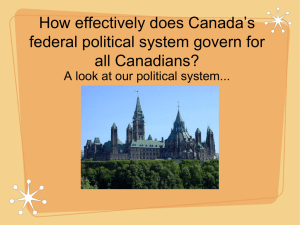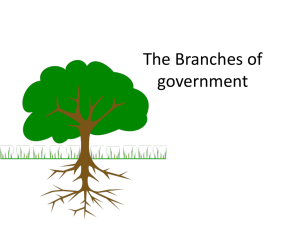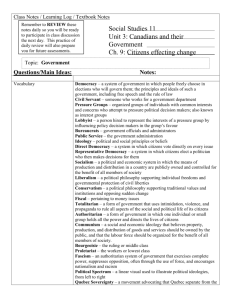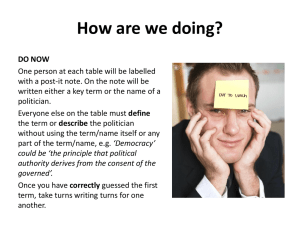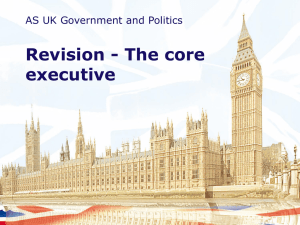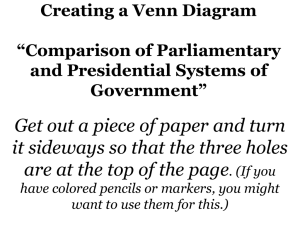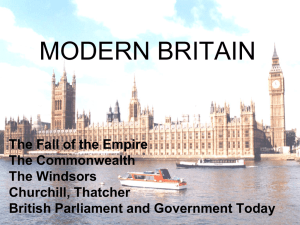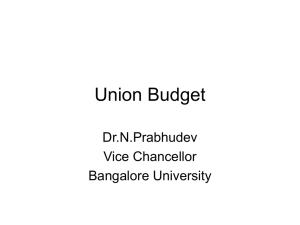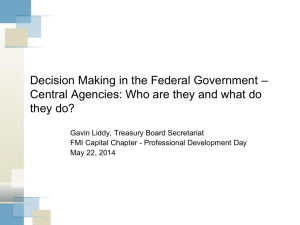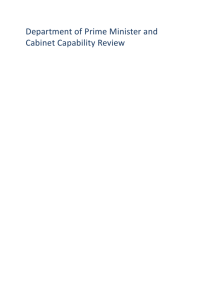L20_Exam feedback
advertisement
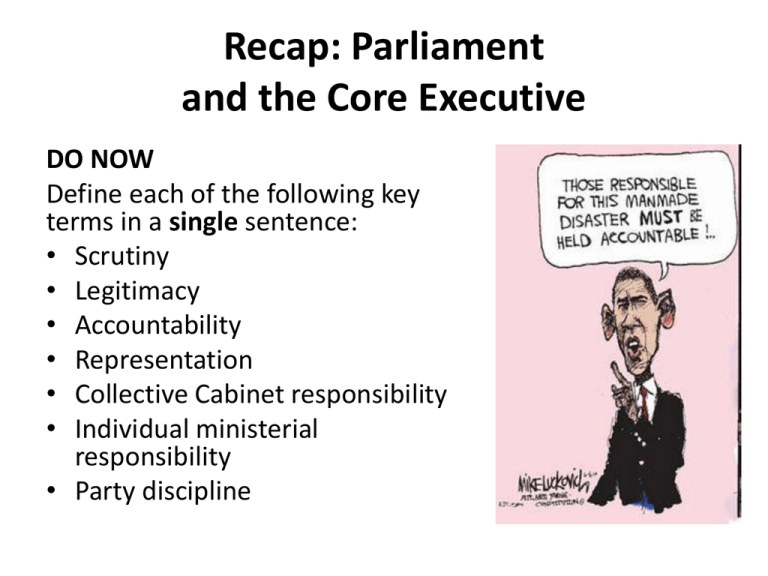
Recap: Parliament and the Core Executive DO NOW Define each of the following key terms in a single sentence: • Scrutiny • Legitimacy • Accountability • Representation • Collective Cabinet responsibility • Individual ministerial responsibility • Party discipline Self-evaluation I would describe my performance in last Thursday’s assessment as . . . 0 Insultingly poor 1 2 3 Weak 4 5 Credible Self-evaluation I would describe my performance in last Thursday’s assessment as . . . 0 Insultingly poor 1 2 3 Weak 4 5 Credible Abdi, Clinton, Humza Loshell, Loretta Troy, Tanique Tyreek Learning objectives • To improve on our (mostly dreadful) performance in our mock examination Feedback on your first essay – 23rd Sept • Read the question – ‘Discuss’ implies engagement with both sides of a debate • Key terms should be defined in a way that is not simply descriptive • Points should be rather more specific than they are general and more developed than superficial • Use evidence rather than speculation to support your key points Feedback on your first essay – 23rd Sept • Read the question – ‘Discuss’ implies engagement with both sides of a debate • Key terms should be defined in a way that is not simply descriptive • Points should be rather more specific than they are general and more developed than superficial • Use evidence rather than speculation to support your key points Writing with clarity and specificity What I’m seeing The HofC can come across as bias because a majority of MPs are working with the government. 0 marks What I want to see Writing with clarity and specificity What I’m seeing The HofC can come across as bias because a majority of MPs are working with the government. 0 marks What I want to see The ability of the HofC to scrutinise the executive is limited by the extent of the payroll vote, or the number of MPs who derive a salary directly from government. These MPs are effectively guaranteed to vote for government policies. 2 marks Writing with clarity and specificity What I’m seeing The HofL is more likely to scrutinise the government because it isn’t so closely tied to it. 0 marks What I want to see Writing with clarity and specificity What I’m seeing The HofL is more likely to scrutinise the government because it isn’t so closely tied to it. 0 marks What I want to see The HofL can provide more effective scrutiny of the executive because party discipline is less strong among peers than among MPs. The party of government is therefore less able to sway peers from voting their conscience. 2 marks Develop your responses What I’m seeing A free vote is a vote in the House of Commons in which the executive stays strictly neutral and doesn’t attempt to influence the outcome. 1 mark What I want to see Develop your responses What I’m seeing A free vote is a vote in the House of Commons in which the executive stays strictly neutral and doesn’t attempt to influence the outcome. What I want to see A free vote is a vote in the House of Commons in which party discipline plays no role. MPs are able to vote their conscience and the party of government and official opposition do not resort to the whip to influence the outcome. 1 mark 3 marks Use evidence appropriately What I’m seeing The ability to determine who sits in cabinet is a source of power, but constant reshuffles can make a prime minister look weak and unsure. This was the case in Gordon Brown’s time in office, which was notably short. This outlined his weakness massively. What I want to see Use evidence appropriately What I’m seeing The ability to determine who sits in cabinet is a source of power, but constant reshuffles can make a prime minister look weak and unsure. This was the case in Gordon Brown’s time in office, which was notably short. This outlined his weakness massively. What I want to see The ability to determine who sits in cabinet is a source of prime ministerial power, but constant reshuffles can make a prime minister look weak. This was a feature of Gordon Brown’s tenure in office. Brown’s decision to force major reshuffles three times in under three years, made him appear indecisive and failed to stem briefings against him. Guided reading • Read the article by Anthony Seldon • Summarise the key points of the article; aim for three • Highlight/underline examples of how the author uses evidence to support and develop his points Identify the key words Evaluate the factors that can give the prime minister power over other cabinet members. Identify the key words Evaluate the factors that can give the prime minister power over other cabinet members. Powers of the prime minister Role Description Key powers Limitations Chairperson The Prime Minister sets the agenda for the Cabinet and, by extension, for the wider government. (S)He dictates the order or policy meetings and decides what issues are discussed and when. • Setting the policy agenda • Party • Public opinion Chief executive The Prime Minister appoints ministers, including to Cabinet posts, and determines how government departments should be organised. They are also the head of the Civil Service, which implements Government policy. • Patronage • Managing the machinery & personnel of government • Cabinet • Party Chief communicator The Prime Minister is the face of the Government--particularly in times of crisis. On issues such as Terrorism or Disasters they are the lead communicator on behalf of the Government. • Influencing the National mood • Public opinion Chief legislator The Prime Minister is the official overall spokesperson for the Government in Parliament. They answer questions in Parliament and can be decisive in pushing through legislation. • Setting the legislative agenda • Parliament • Party Chief diplomat As the head of the Government it is the Prime Minister that acts as the face of Britain Internationally, whether this is at the EU, NATO, UN or other organisations. • Declare war • Sign treaties • Britain’s geopolitical and economic position Re-draft the following One example of the prime minister’s power over Cabinet members is the power to discuss whatever he/she wants. The prime minister can tell the cabinet what to talk about and not talk about anything that he doesn’t want. This means that a cabinet member who wants to discuss something the prime minister doesn’t can’t make much progress in cabinet. Identify the key words ‘The House of Lords can often be more effective than the House of Commons in the scrutiny of the executive.’ Discuss. Identify the key words ‘The House of Lords can often be more effective than the House of Commons in the scrutiny of the executive.’ Discuss. Examples of scrutiny instruments • The tools that Parliament uses to hold the executive to account are sometimes called “scrutiny instruments”. • In pairs, list as many scrutiny instruments as you can. Examples of scrutiny instruments • • • • • Question time Select committee inquiries Public readings Public bill committees Full house debates Which of these are available to the HofL? • • • • • Question time Select committee inquiries Public readings Public bill committees Full house debates Factors that favour the HofL • Peers usually lack further political ambitions • Peers don’t have to face the electorate • Peers don’t have to face the media to the same degree as MPs • Higher percentage of peers sit as cross-benchers (independents) • Peers have often ‘earned’ their appointments through professional distinction, hence may have greater expertise than MPs • Peers have more time for debate and discussion Section A Answer all of the questions in this section • Using the sources and your own knowledge, outline the convention of collective ministerial responsibility. (6) • Using the sources and your own knowledge, outline the convention of individual ministerial responsibility. (6) • Using the sources and your own knowledge, discuss the importance of collective and individual ministerial responsibility to the UK system of government. (28) Section B Answer one question in this section • Discuss the view that the rule of law is the most important underlying principle of the UK’s constitution. (30) • Discuss the increasing importance of the judiciary in the UK system of government. (30) • Discuss the reasons why membership of the EU has been such a divisive issue in British politics. (30)

